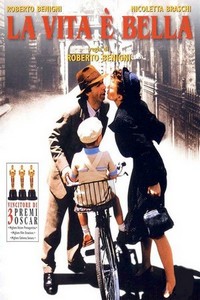
La Vita È Bella (1997)
Life Is Beautiful

Raiting: ![]() 8,7 /10
8,7 /10
Genre: Comedy
Director: Roberto Benigni
Stars: Roberto Benigni, Nicoletta Braschi and Giustino Durano
Country: Italy
Release date: 20 December 1997
Length: 122 minutes


Raiting: ![]() 8,7 /10
8,7 /10
Genre: Comedy
Director: Roberto Benigni
Stars: Roberto Benigni, Nicoletta Braschi and Giustino Durano
Country: Italy
Release date: 20 December 1997
Length: 122 minutes